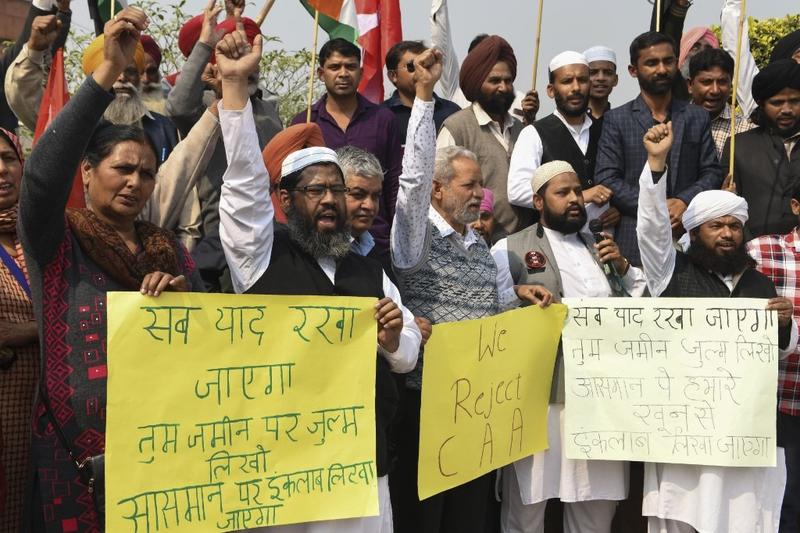 Demonstrators shout slogans and hold placards during a protest against the Indian government's Citizenship Amendment Act (CAA) and the National Register of Citizens (NRC), in Amritsar on Feb 24, 2020. (NARINDER NANU / AFP)
Demonstrators shout slogans and hold placards during a protest against the Indian government's Citizenship Amendment Act (CAA) and the National Register of Citizens (NRC), in Amritsar on Feb 24, 2020. (NARINDER NANU / AFP)
NEW DELHI - The United Nations High Commissioner for Human Rights has filed an intervention application in India's Supreme Court over the controversial Citizenship Amendment Act (CAA).
CAA aims at granting citizenship to illegal immigrants belonging to six religions - Hinduism, Sikhism, Buddhism, Jainism, Zoroastrianism and Christianity - from Bangladesh, Afghanistan and Pakistan
However, the move was strongly rejected by India's foreign ministry Tuesday, saying CAA was an internal matter and no foreign party has any standing on issues pertaining to India's sovereignty.
"The CAA is an internal matter of India and concerns the sovereign right of the Indian Parliament to make laws. We strongly believe that no foreign party has any locus standi on issues pertaining to India's sovereignty," reads a statement issued by India's foreign ministry spokesperson Raveesh Kumar.
ALSO READ: India's top court issues notice to federal govt over citizenship law
The petition filed by the UN body asks the top court to make it a party in the case against the CAA that is being heard by the top court.
"We are clear that the CAA is constitutionally valid and complies with all requirements of our constitutional values," the spokesperson said. "We are confident that our sound and legally sustainable position would be vindicated by the Hon'ble Supreme Court."
Over 140 petitions challenging the new citizenship law have been filed in the country's Supreme Court.
CAA aims at granting citizenship to illegal immigrants belonging to six religions - Hinduism, Sikhism, Buddhism, Jainism, Zoroastrianism and Christianity - from Bangladesh, Afghanistan and Pakistan. However, it has kept out Muslim immigrants from applying for citizenship.
Protests against the CAA were triggered in December last year after India's upper house of parliament passed the law.
So far, the violence triggered by the protests has killed over 70 people across India.
Last week communal violence broke out between pro- and anti-CAA groups in the northeastern part of India's capital New Delhi. At least 46 people were killed and over 300 injured in the violence.
READ MORE: Indian police arrest over 500 for Delhi sectarian violence
The violence left a trail of damage in the northeastern parts of the city as rioters torched vehicles, vandalized shops and burnt buildings including schools.
Many people, especially Muslims, have their homes in the affected areas and took refuge in the shelters set up by government and relief workers.


